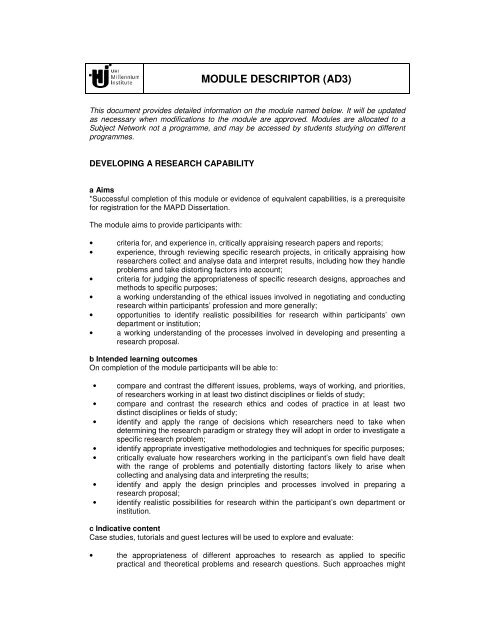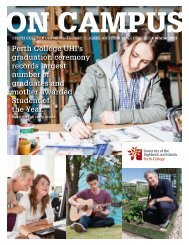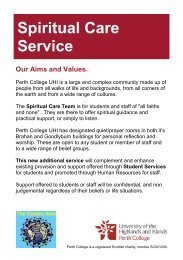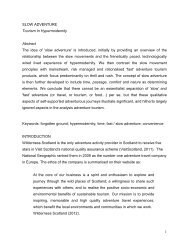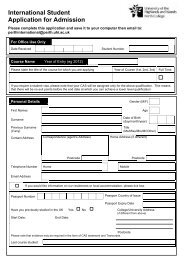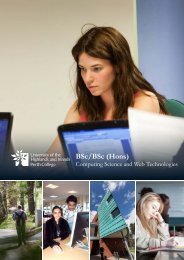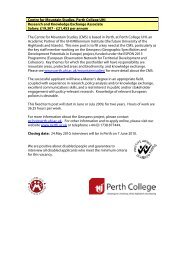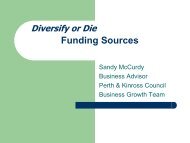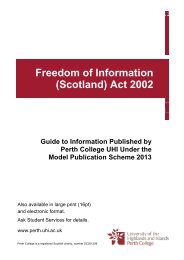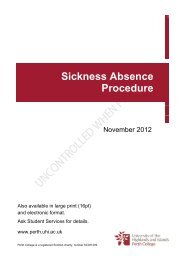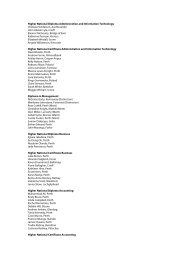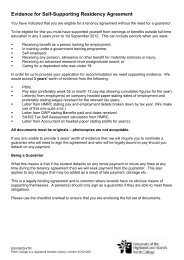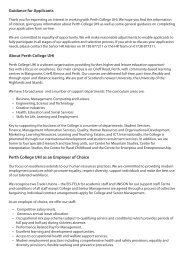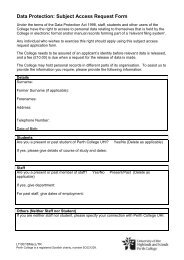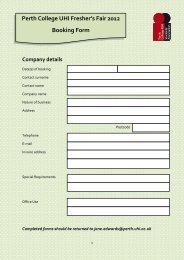Developing a research capability
Developing a research capability
Developing a research capability
- No tags were found...
You also want an ePaper? Increase the reach of your titles
YUMPU automatically turns print PDFs into web optimized ePapers that Google loves.
include ethnography, social surveys, documentary analysis, randomised trials andlaboratory, psychological and industrial experiments;• the means by which data are analysed;• the criteria used to interpret <strong>research</strong> findings and reach conclusions;• ethical implications of both <strong>research</strong> and the application of its findings.Participants will also:• identify key concepts and concerns which are fundamental to most kinds ofsystematic and rigorous enquiry, including inference, induction, deduction, types oferror, reliability, validity, scale effects, representativeness and generalisation, andcompare their application in more than one discipline or field of study;• use what they have learned from the above activities to critically review a published<strong>research</strong> paper or report which is relevant to their professional practice;• participate in an electronic discussion group where they will present their own thinkingabout their <strong>research</strong> proposal for constructive comment from their peers and offertheir own constructive comments on others’ proposals. A key objective is to develop acomparative perspective on the different ways of thinking, approaches, priorities andconcerns of <strong>research</strong>ers working in different disciplines and areas;• develop a proposal for a <strong>research</strong> project on a topic or issue of their choice.d Mode(s) of delivery and support for teaching and learningFace-to-face 0 hours or … %Video-conference 0 hours or … %Supported online learning 40 hours … %orSelf-directed learning 110 hours … %Total activity 150 100%e AssessmentAssessment 1Part AA critique of a published <strong>research</strong> paper or report, in a seminar (video-conference and/orface-to-face), equivalent to about 2000 words, and focussing on:• the appropriateness of the methodology to the problems or <strong>research</strong> questions;• the extent to which the weight given to specific outcomes reflects the evidence and itsrelevance to the problems, issues or questions identified at the start;• the extent to which the evidence justifies conclusions and recommendations; theclarity of the presentation.Ethical IssuesParticipants' choice of paper must be notified in writing in time to be formally approved atleast ten days in advance of the seminar. Texts for analysis will normally be chosen from anacademic journal or mainstream professional publication.Relates to Outcomes iii), iv), v) 30%.Part BA succinct written analysis of the seminar (about 1500 words) focussing on:• characterisation of the types of <strong>research</strong> analysed by seminar participants;• similarities and differences;• the range of approaches and problems addressed;• the range of methodologies and techniques employed;• the difficulties and distorting factors affecting the conduct and interpretation of the<strong>research</strong>;• the range of ethical problems encountered;
• preparation for this submission will include (non-assessed) discussion betweenparticipants about the seminar.Relates to Outcomes i), ii), iii), iv) 20%.Assessment 2A <strong>research</strong> proposal (2,000 – 3,000 words) which will include:• an abstract or summary;• a statement of background and purpose relating the proposed work to the participantsown professional context;• evidence of a literature search designed to contextualise the proposed <strong>research</strong>;• a statement of aims and objectives;• a rationale for the <strong>research</strong> design;• clarification of any ethical, logistic or other problems which may arise during the<strong>research</strong> process or in the application of results;• a statement of resource requirements;• a time-scale for work elements and completion.Participants will be strongly encouraged to engage in (non-assessed) discussion with eachother and others with knowledge of the field, in order to complete this exercise. A written A4page outline will be required for discussion and review 4 weeks before the deadline forproposal submission.Relates to Outcomes iii), iv), vi), vii) 50%.f Key learning resourcesReading List:Some elements of the reading list are likely to vary according to the specific interests anddisciplines of participants.Core:Bell, J., Doing Your Research Project, Buckingham, Open University Press, 1997.Bryman, A. (ed), Doing Research in Organisations, London, Routledge, 1988.Carr, W., For Education: Towards Critical Education Inquiry, Buckingham, Open UniversityPress, 1995.Cooper, H.M., Integrating Research: A Guide for Literature Reviews, London, Sage, 1989.Greenfield, A., (1996) Research Methods: Guidance for Postgraduates, Arnold, London.Robson, C., Real World Research, Oxford, Blackwells, 1996.Recommended:Diamond, W.J., (1981) Practical Experimental Designs for Engineering and Science, VanNostrand Reinhold, New York.John, J.A. & Quenouille, M.H. (1977), Experiments: Design and Analysis, Griffin, London.Pocock, S. (1983), Clinical Trials: A Practical Approach, John Wiley, Chichester.Shipman, M.D., The Limitations of Social Research, London, Longman, 1988.Walker, R., & Schratz, M., Research as Social Change, London, Routledge, 1995.Journals:Recommended journals are also likely to vary according to each cohort of participants.However, key journals would include:
• studies in Higher Education;• teaching in Higher Education;• learning and Instruction;• journal of Graduate Education;• <strong>research</strong> Policy and Planning.g Additional background informationOn starting the module each participant will be expected to do some preliminary reading of atleast two of the key texts in the Reading List depending on their profession, discipline or workrelatedneeds, and to obtain copies of any relevant codes of practice or <strong>research</strong> ethicsrelating to their professional practice.Participants will then be required to participate in a residential induction workshop. This willprovide opportunities for the student group to participate in tutor-led seminars and groupdiscussions (i) on their preliminary reading and how it relates to the main themes of themodule, and (ii) to examine a number of case studies of <strong>research</strong> in action taken from keyreadings in the recommended texts and relevant journals; and (iii) to critically examine avariety of codes of <strong>research</strong> practice currently in use in the participants’ professions. Therewill also be opportunities for one-to-one tutorials in order to explore plans for assignments andreading.h Specialist resource requirements• internet access to web and e-mail facilities;• access to a PC and printer;• access to on-line library resources.


